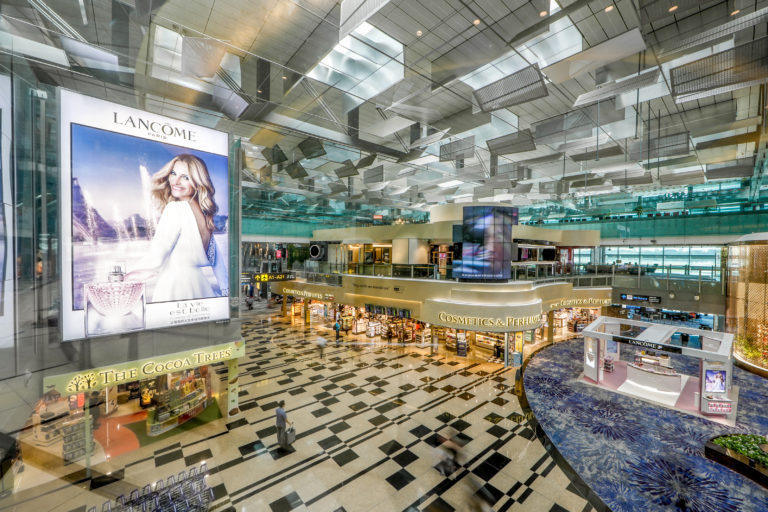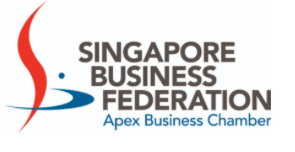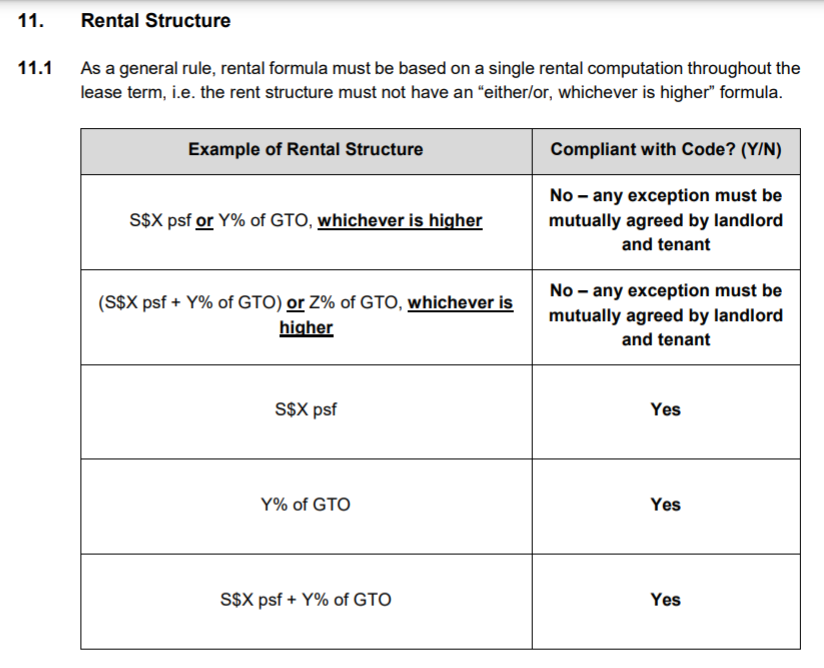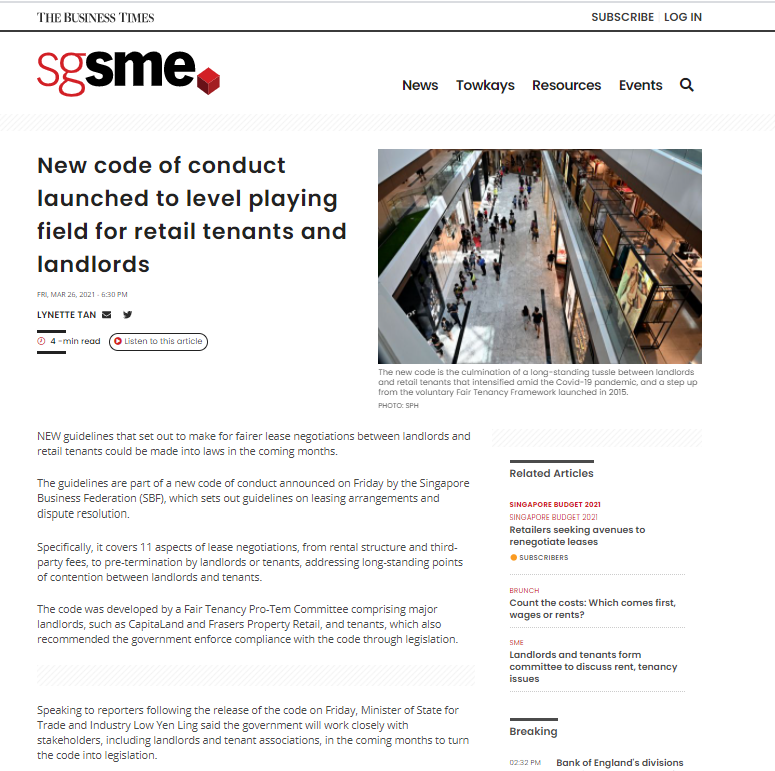
SINGAPORE. In an initiative with potentially far-reaching repercussions for airport contracts, a Code of Conduct is to be introduced governing the leases of retail premises in Singapore, including airports.
In a clause of particular interest to the airport community not just in Singapore but worldwide, the Code of Conduct says, “As a general rule, rental formula must be based on a single rental computation throughout the lease term, i.e. the rent structure must not have an ‘either/or, whichever is higher’ formula.
That clause is qualified in the following terms: “On an exceptional basis, if both parties agree to an alternative rental structure that is not based on a single rental computation, such alternative rental structure can be included in the lease agreement.
“A joint declaration by both parties on the agreed alternative rental structure must be made to FTIC [Fair Tenancy Industry Committee] within 14 days after the lease agreement has been signed by both parties.”
The Moodie Davitt Report is seeking further clarification on this and other key clauses in the Code of Conduct.
Approach for comment, Changi Airport Group told us: “We are currently seeking clarifications on the Code of Conduct in relation to Changi Airport from the relevant authorities.”

Local media Business Times quoted Minister of State for Trade and Industry Low Yen Ling saying on Friday that the government will work closely with stakeholders, including landlords and tenant associations, in the coming months to turn the code into legislation. Government landlords will lead by complying with the code of conduct, unless there are other statutory obligations to abide by, Ms Low said.

Changi Airport Group (CAG), which was corporatised in 2009, runs Changi Airport and strikes its concession agreements. Key Changi Airport commercial contracts are generally based on a formula of the retailer or other operator paying a minimum monthly guarantee or a percentage of sales, whichever is higher.
The Code of Conduct was announced yesterday by the Singapore Business Federation* (SBF), the apex business chamber championing the interests of the Singapore business community in the areas of trade, investment and industrial relations. It represents 27,200 companies, as well as key local and foreign business chambers. The document has been heavily influenced by the severe pressures on Singaporean businesses caused by the COVID-19 pandemic.
“There are escape clauses [regarding the ‘either/or, whichever is higher’ formula -Ed] so you’ve got to see how it plays out but what you can say for sure is that there’s been nothing like this that’s even tried to govern the relationship between airports and retailers in contract terms. So it’s a step above what’s gone before,” said Ivo Favotto, owner of The Mercurius Group, a Sydney-based specialist airport commercial revenues consultancy [see full comments in sidebar below].
 Asked for comment by The Moodie Davitt Report, King Power Group (HK) CEO Sunil Tuli, whose company has operated at Changi Airport for many years said he was still studying the detail, adding: “It will be interesting to see how our businesses get affected at the airport in terms of contracts.
Asked for comment by The Moodie Davitt Report, King Power Group (HK) CEO Sunil Tuli, whose company has operated at Changi Airport for many years said he was still studying the detail, adding: “It will be interesting to see how our businesses get affected at the airport in terms of contracts.
“The airport, like many others, have had a MMG or percentage of sales (whichever is higher) formula for years. Also, the early termination from either landlord or tenant is another area we would be keen to learn more about.
“What is important is that the Singaporean Government has again shown how progressive it is, and always a step ahead. It’s not just about bailout packages (which are important especially during this crisis), but also thinking about ways to improve the future. The government never ceases nor fails to impress.”


The initiative follows the creation of the Fair Tenancy Pro Tem Committee in June 2020 to strengthen collaboration between Singapore’s landlords and tenants. Its intent was to address long-standing tenancy issues for the retail, food & beverage (F&B), and lifestyle sectors, and establish industry norms on tenancy practices and terms.
| Material change to the balance of negotiation power between airports and retailer?
“But there are many other elements of the airport-retailer relationship impacted. These include exclusivity, POS system integration, material-adverse change clauses, rental bonds, termination clauses and public liability insurance requirements. Each of these elements is significant in its own right and will materially change the balance of negotiation power between airports and retailers. “As with any code of conduct, you need to be wary of unintended consequences – for example, the code could push an airport to be more risk averse: seeking the surety of MMGs rather than sharing risk via percentage of sales agreements (or other form of profit-sharing agreement). And of course the Code contains ‘escape clauses’ that allow changes to be made ‘if both parties agree’. “In situations where there is negotiation power imbalance between airport and landlord, could one party essentially coerce the other party to agree to variations from the Code? If someone wants to win a duty free concession badly enough, would they agree to a ‘whichever is higher clause’? “The language of the Code only envisages such changes in ‘exceptional circumstances’ although this term is undefined.” *Ivo Favotto has worked for all stakeholder groups in the airport Trinity. He worked for the Federal Airports Corporation in Australian from 1992 to 1997; and held senior roles with The Nuance Group (now part of Dufry), including Executive Vice President – Strategy & Business Development, and Lagardère Travel Retail. He also runs his own destination merchandise supply business, Next 88, specialising in airport retail. |
The Fair Tenancy Pro Tem Committee comprises 18 key representatives from the landlord and tenant communities, industry experts and members from academia.
The SBF facilitated the work of the Committee and discussions between landlords and tenants over the last nine months. The Committee focused on three specific areas during the discussions – rental data transparency to ensure parties make informed decisions, regulation of conduct to prevent the inclusion of unfair tenancy practices and behaviour, and an enforceable dispute resolution mechanism.
Through the deliberations, the Code of Conduct was formulated. Its three objectives are:
• To provide a set of guidelines to enable a fair and balanced position in lease negotiation;
• To develop a governance framework to ensure compliance by the industry;
• To introduce an accessible dispute resolution framework.

The Code sets out guidelines for the negotiation of lease agreements in 11 areas, including rental structure, third-party fees, pre-termination by landlords or tenants, and data sharing. The Code is applicable to all qualifying retail premises in Singapore, which can be housed in standalone commercial buildings such as shopping centres, office buildings, shop houses, MRT stations, or other types of buildings.

It also sets out a process for resolving disputes after lease agreements have been signed. Through this process, either the landlord or the tenant may escalate the matter to the Singapore Mediation Centre (SMC) within 14 days to resolve the dispute or disagreement.

The members of the Committee have committed to adopt and abide by the Code from 1 June 2021. They also pledged to encourage their stakeholders in the retail, F&B, and lifestyle sectors to adhere to the guidelines. Critically, the Committee has recommended to the Government for compliance with the Code to be made mandatory via legislation.
Changi Airport Group Executive Vice President, Commercial Lim Peck Hoon offered a candid yet ultimately uplifting view of business at the APTRA APAC Dialogue webinar on 17 March, staged by the Asia Pacific Travel Retail Association and The Moodie Davitt Report; click to view
A Fair Tenancy Industry Committee (FTIC) will be formed by 1 June 2021 to serve as the custodian of the Code and to monitor industry compliance. Representatives from both the landlord and tenant communities, as well as other independent representatives, will be on the Committee.
The Committee has submitted its report to the Minister for Trade and Industry Chan Chun Sing and Minister for Home Affairs and Minister for Law K Shanmugam. The report details the outcome of the Committee’s deliberations and its recommendations.
Michael Lim, Chairman of the Fair Tenancy Pro Tem Committee said, “I am glad that the tenants and landlords were able to reach a consensus on many issues on rental and tenancy. The jointly developed industry-led Code is a significant milestone and marks substantive progress from when we first started. I am confident that it will set the standards for future lease negotiations and raise the vibrancy and competitiveness of the retail industry moving forward.”
Lam Yi Young, CEO of SBF said, “SBF is pleased to be able to play a facilitative role in establishing a more collaborative landlord-tenant eco-system. The work of the Committee highlighted the important symbiotic relationship between landlords and tenants, and the deliberation process helped to foster greater mutual trust between both parties. This, in turn, will help create a more conducive business environment for the retail sector.”
ABOUT THE SINGAPORE BUSINESS FEDERATION
The Singapore Business Federation (SBF) is the apex business chamber championing the interests of the Singapore business community in the areas of trade, investment and industrial relations. It represents 27,200 companies, as well as key local and foreign business chambers.
In July 2001, the Minister for Trade and Industryintroduced a Bill in Parliament to establish the SBF Act, which was passed by Parliament and became law on 5 Oct 2001. The Federation was then established on 1 April 2002, with the aim of representing the business community’s interests both locally and overseas. Under the SBF Act, all Singapore-registered companies with share capital of S$0.5 million and above are members of SBF.






 Ivo Favotto*, owner of The Mercurius Group, a Sydney-based specialist airport commercial revenues consultancy, who writes The Analyst column for The Moodie Davitt Report, said: “The code is wide reaching and will impact many areas of the airport-retailer relationship. Of course the most significant impact is on rent with the potential elimination of the ‘whichever is higher’ clause. So airports can charge either a MMG or a variable rent, not both.
Ivo Favotto*, owner of The Mercurius Group, a Sydney-based specialist airport commercial revenues consultancy, who writes The Analyst column for The Moodie Davitt Report, said: “The code is wide reaching and will impact many areas of the airport-retailer relationship. Of course the most significant impact is on rent with the potential elimination of the ‘whichever is higher’ clause. So airports can charge either a MMG or a variable rent, not both.






